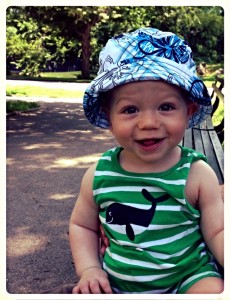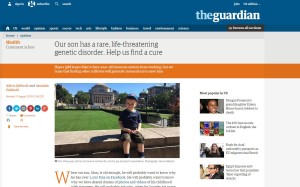Another great article on Idan by Tova Ross. Jewish Baby With Rare Disease Needs Bone Marrow Transplant.
Read Full article here: http://bit.ly/1d6jACP Please like and share!

Idan Zablocki Amanda and Akiva Zablocki, Jewish parents on Manhattan’s Upper West Side, are spending the month of Elul on the phone battling insurance companies. Their one-year old son, Idan (“era” in Hebrew), will soon be undergoing a bone marrow transplant for Hyper IgM, a rare genetic immune deficiency disorder that affects only two in a million people. The family’s Rosh Hashanah, Yom Kippur and Sukkot will take place at the Seattle Children’s Hospital as they prepare Idan for the surgery.
For the Zablockis, the theme of being inscribed in the Book of Life in the coming year has taken on new meaning.
When Idan was eight months old, he began experiencing irregular breathing; weeks and many medical tests later, doctors diagnosed him with Hyper IgM, which attacks the immune system and leaves those with the condition unable to fight off common infections. Play dates, trips outdoors and family gatherings became minefields of potential germs and were severely limited or eliminated completely. Akiva, 33, and a former IDF soldier who was raised in Israel, became a stay-at-home father to care for Idan.
“When our family members visit, they have to have changed into fresh clothes beforehand, and if they feel they have any cold or cough symptoms developing, they cannot come at all,” Akiva explains. “Idan is bathed in filtered water and when I take him to Central Park, I have to stay away from the crowds and keep him in a secluded area.”
Doctors say the transplant is Idan’s only hope of a cure, but it’s a risky procedure that carries a 10-15 percent risk of fatality. The Zablockis just spent months flying to different U.S. cities to find the best place for Idan’s surgery, and chose Seattle, where both the bone marrow transplant was invented and the condition of Hyper IgM first discovered.
Amazingly, finally pinning down Idan’s diagnosis and the months-long search for a hospital seem almost easy compared to the monumental struggle they now face as they look for a way to pay for it. The transplant costs an estimated $1 million, and Seattle Children’s Hospital is out of network. This means that insurance will pay whatever it deems reasonable in addition to charging a $50,000 co-pay, and whatever they deem not reasonable will fall to the Zablockis. Furthermore, Amanda, 28, who works as an attorney, will need to take months of unpaid leave from work to go to Seattle, and she and Akiva will need to pay out of pocket for a COBRA health plan. Overall, they estimate they will be responsible for at least $250,000 to $650,000. Idan and his parents.
“Instead of spending the remaining precious days with our son before the transplant in Seattle,” Amanda says, “we are spending our days and nights worrying about insurance and trying to come up with creative solutions.”
She and Akiva, who holds a Master’s in Public Health, utilize their knowledge and negotiating skills for hours on the phone each day as they battle their insurance company for more coverage and decipher obscure bylaws. In their free time, they run an online fundraising campaign for the medical costs Idan’s surgery and treatment will incur and raise awareness of their immense struggle. So far, they have raised just over half of their $250,000 goal.
Akiva also draws from his personal experience; as a 25-year old senior at Columbia University, he was diagnosed with a tumor on his brain stem, and doctors refused to touch it. Akiva fought and researched for months before finding a neurosurgeon in Arizona who would operate, and Akiva survived the risky operation. He observed firsthand the incredible complexities of the American medical system, which inspired him to found Health2Social, a healthcare and social media blog, and earn a degree in public health.
“I almost feel like our family paid its dues with the stress of Akiva’s brain tumor,” says Akiva’s brother, Yitzi. “Lightening should not strike twice. But, if anything, Akiva’s experience did make our entire family more educated on the healthcare system. And if I was sick, I would want my parents to be a lawyer and a healthcare expert with a lot of social clout. Idan is in the best possible hands with them.”
Amanda’s sister Elisabeth says, “I have always admired Amanda’s fortitude and patience, and in the last three months, watching her and Akiva go to the ends of the earth to help Idan, she’s only proven her interminable strength. My sister will never stop fighting, and when she tires, she revives herself by leaning on Akiva. I’ve also seen Amanda in moments of deep sadness, and the strength and happiness she derives from all the well-wishers around the world who have donated to Idan’s fund and written messages of support.”
With much of the press the Zablockis have been afforded focusing on medical and insurance issues, Elisabeth also reminds everyone that at the center of this is Idan, who is in pain much of the time but still retains his joyous and, at times, mischievous nature.
“He likes to dance to music and has long conversations, albeit in a language I don’t quite understand yet, and he can get frustrated when he tries to stand and can’t because he set his expectations too high,” she says. “He makes me laugh with his antics, he’s willing to try any food, and he loves being told a story or sung to. He is only one, but he is a little person who has likes and dislikes, and he is going to have to endure pain no one should ever experience.”
The surgery, which is scheduled for September, requires six month of intensive aftercare and normal childhood vaccinations in Seattle before Idan and his parents can think of returning home.
“We’re a close-knit family, and we feel powerless because there’s little that we can actually do to help,” comments another of Amanda’s sisters, Sabrina. “There’s a hole in our lives because we miss Idan terribly, and he won’t be able to share in our annual Chanukah bash or join us at the Seder table this year because he will be recovering from his surgery. We’re a Jewish home missing an integral part of our family. The words of Rosh Hashanah will haunt me even more than usual this year: ‘On Rosh Hashanah it is written, on Yom Kippur it is sealed, who shall live and who shall die.’ ”
Idan’s full Hebrew name is Idan Yarden ben Esther.
Read more at: http://www.jewishpress.com/sections/features/jewish-baby-with-rare-disease-needs-bone-marrow-transplant/2013/08/21/0/
http://bit.ly/1d6jACP
Please like and share!



